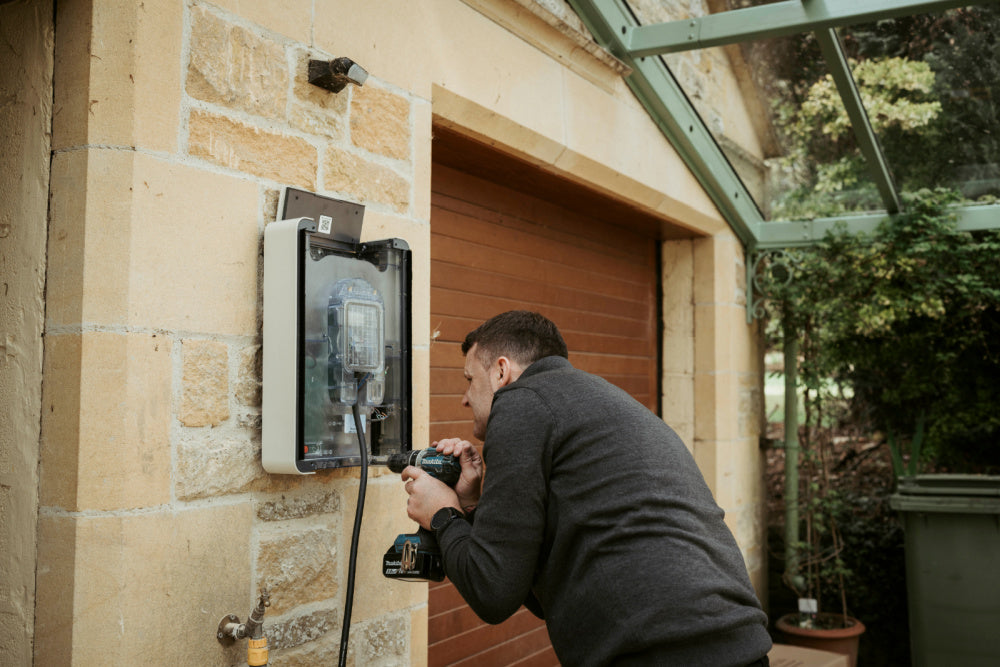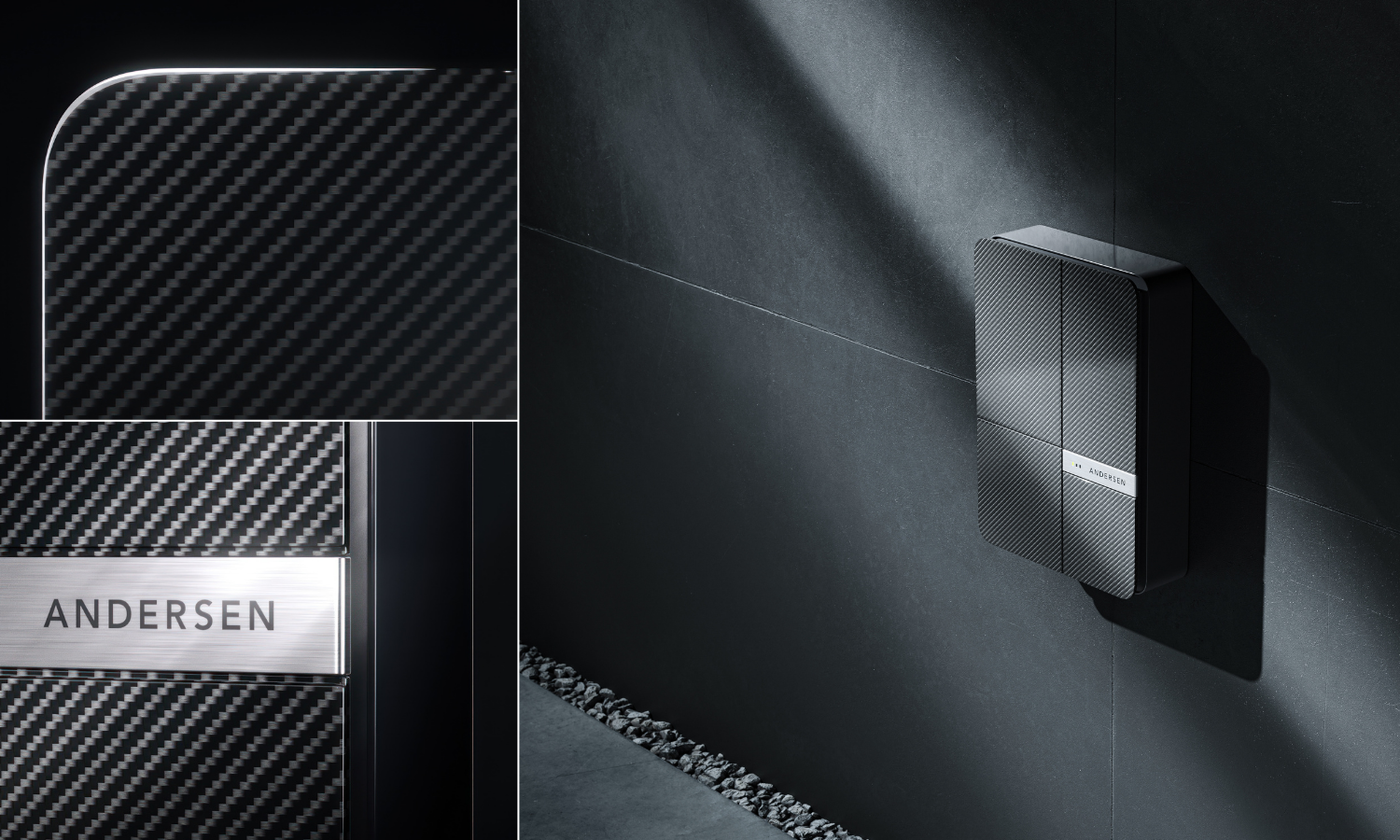If you’re considering purchasing an EV charger for your home, then it’s likely you have one pressing question on your lips… “How much does it cost to install an EV charger at home?” It’s an understandable question, and it’s one that the Andersen EV team has answered in this article. Keep on reading to find out more…
The answer:
Before we continue, we’ll give you the answer you came here for; how much does it cost to install an EV charger at home?
The answer is that, depending on the type of installation you want, it can cost approximately between £400 and £600 to install an EV charger at home.
We’ll cover this in more detail further on, before if you were just looking for a ballpark figure for EV home charger installation, you’ve just found it!
Installation considerations
Before you rush out and order an EV charger for your home, there are a number of important considerations you should give some thought to. None of these should be seen as ‘barriers’ however. In many cases, the installer will take care of the majority of the work.
Neighbour permission
If your home has a ‘looped’ electricity supply, then you may also need to secure permission from your neighbour.
This is because a looped electricity supply is where two properties share a single electricity service cable from the main network. This kind of supply is most commonly found in semi-detached and terraced properties.
Therefore, any additions you make to your home electricity supply could impact your neighbour; hence, you should request their permission before installing an EV charger.
It’s important to bear in mind that looped electricity supplies are not particularly common - so it’s rare for this issue to arise. If you’re in doubt, then an installer will be able to advise you on what type of electricity connection your home has.
Wi-Fi
This is an important, but often overlooked point; home EV chargers require a Wi-Fi connection.
Home EV chargers - such as the Andersen A2 - use a Wi-Fi connection to accept instructions from the app on your smartphone, adjust charging times and schedules, track charging rates and more.
This is something that often trips people up who decide to arrange installation themselves. An electrician will be able to install the charger, but then you’ll be left having to figure out how to connect it to your Wi-Fi (particularly if your current Wi-Fi isn’t strong enough to reach the charger).
Choose to have your charger installed by the manufacturer, and you’ll often find that they will take care of the Wi-Fi too, installing a Wi-Fi booster where necessary (that’s certainly something we do at Andersen EV!).

Off-street parking
Provided you have permission, then you’ll also need to think about whether you have off-street parking (e.g. a driveway).
Having off-street parking such as a driveway is pretty much an essential for home EV charging. If you are only able to park on the street, then this makes things more complicated and in the majority of cases you won’t be able to install an EV charger on your property.
Building Regulations
The Building Regulations set out the standards that new buildings and changes to existing buildings must comply with. The regulations cover specific topics such as structural integrity, electrical and gas safety, fire protection, accessibility and more.
In the context of a home EV charger installation, this means that the installer must complete the installation in line with BS 7671: Requirements for Electrical Installations (also known as the IET Wiring Regulations).
The easiest way to check that an installer is able to install your EV charger in compliance with BS 7671 is to ensure they are registered with NICEIC. The NICEIC is a national register of electrical contractors and businesses. It assesses these contractors and businesses on a regular basis to ensure that the installation work they undertake is safe and meets all applicable standards.
Note - here at Andersen EV, all of our in-house installers and partner installers are NICEIC registered and will install your EV charger in line with BS 7671.
Permission
In order to install an EV charger at a property, you must either be the owner of the property, or have permission from the owner (e.g. the landlord).
Another important point to consider is whether you require planning permission. In the majority of cases, installing an EV charger falls under ‘permitted development rights’. This means you don’t need to apply for planning permission.
However, there are some important exceptions to this where you may need to apply for planning permission. These include:
- If you live in a listed building.
- Your home is in a designated area such as an Area of Outstanding Natural Beauty (AONB), a National Park, a conservation area, or a World Heritage Site.
- Your permitted development rights have been withdrawn.
- You live in a flat or maisonette, as these types of properties don’t normally have permitted development rights.
Note - if you are in any doubt about whether you need planning permission to install an EV charger at your home, please contact your local planning office. They will be able to inform you if your property has permitted development rights in place or not.
Distribution Network Operator (DNO) approval
In some cases, you may need to seek approval from your local Distribution Network Operator (DNO) for installation of your EV charger. However, in about 90% of cases you don’t need to worry about this.
Distribution Network Operators are licensed companies that own and operate the electrical power distribution networks across the UK. These six companies are:
- Electricity North West.
- Northern Powergrid.
- SP Energy Networks.
- Scottish and Southern Electricity Networks (SSEN).
- UK Power Networks.
- Western Power Distribution.
The reason you may need to seek approval from your DNO prior to installation of your EV charger is because they may need to upgrade your home’s main electrical fuse.
Whether you require an upgraded fuse is dependent on a number of factors, such as the capacity of your home’s existing fuse and the expected electricity demand of your chosen charger.
Even if your home’s fuse is sufficient to handle the electricity demand of your EV charger, you may still need to apply for approval from your DNO. Why? Because the DNO may want to assess the impact of your proposed installation on the local electricity grid.
Securing approval from your DNO can sometimes be a complex process, especially where infrastructure upgrades are required. It’s for this reason that many people choose to have their installation taken care of by the EV charger manufacturer or a third-party installer.
Note - if you choose to have your EV charger installed by the manufacturer or an approved-third party professionals, most of the requirements above will be taken care of on your behalf. If you choose to have your charger installed by your own electrician, you may have to do most of the ‘leg work’ involved in securing permissions etc.
Choosing your installation option
One of the most important things you’ll need to consider when it comes to the cost of installing an EV charger at home, is who will be installing the charger and how.
For the majority of EV charger manufacturers, you will have three installation options open to you:
-
Independent installation - where you purchase the charger and then arrange for a local electrician to install it on your behalf.
-
Andersen EV installation - where you purchase the charger, and the charger manufacturer (such as Andersen EV!) completes the installation as well.
- Installation via an approved partner - many EV charger manufacturers (such as Andersen EV), have a network of approved installation partners who can complete the installation for you.
Which option is correct for you largely depends on how much you want to pay and the lead times you are willing to accept for your charger.
Below, we’ve set out what’s generally involved with each installation option.
Independent installation of a home EV charger
If you’re happy to play the role of a project manager, then going the route of independent installation allows you to do this.
This installation route begins with you selecting your favoured EV charger. Many EV charger manufacturers will allow you to specify and customise your charger (e.g. power output). However, only a few manufacturers allow you to customise your charger to the same extent as Andersen EV (e.g. colour, finish).
Once you’ve ordered your charger, it’ll be delivered to your home.
Once you’ve received your charger, it’s then up to you to arrange for a local electrician to come out and install it.
However, depending on your property and your individual circumstances, you may also be responsible for other tasks such as securing permissions e.g. checking permitted development rights and securing approval from your DNO.
It’s for this reason that many people choose to have the EV charger manufacturer - or one of their approved installers - carry out the installation.
Tip - if you want to order an EV charger and have your local electrician install it, check how much of the process the electrician will be responsible for, and what you’ll have to do.
Manufacturer installation of a home EV charger
By far the most popular option is for the manufacturer to install your EV charger on your behalf.
In this route, you begin by selecting your EV charger and choosing the various options (e.g. features, colours and finishes).
You will then be asked to select installation (which is added as an additional charge at checkout). Here at Andersen EV, when you select the installation option, we’ll ask you to complete a short survey so that we can gauge the type and scope of the required installation.
If you select our ‘premium survey’ option, then one of our installers will visit your property to conduct a full in-person survey.

Following payment, you’ll be contacted by the manufacturer to arrange a date for installation.
For an Andersen A2 home EV charger, the installation process typically takes between four and six hours.
Following installation, many manufacturers will provide you with a tutorial on how to use the charger as well as any extras such as smartphone apps (this is certainly the case for Andersen! Will show all of our customers how to use and get the most out of our Kønnect+ app).
As you can see, having the manufacturer install your EV charger on your behalf is seamless and ensures that all relevant permissions are secured. It also ensures that your EV charger is installed in a safe and compliant way.
Installation of a home EV charger via an approved partner
Should you be buying your EV charger from a manufacturer such as Andersen EV, then you’ll have the third option of having your charging point installed by an ‘approved partner’.
We can’t speak for every manufacturer, but at Andersen, our approved partners are independent electrical companies who have met Andersen’s stringent installation standards. You can find one local to you using our ‘find an installer’ page.
In this arrangement, you’ll select the charger of your choice and then contact the approved partner to arrange installation.
The cost of installing an EV charger at home
So, how much should you expect to pay for installing an EV charge point at your home?
Whilst we provided an initial answer to this question at the beginning of this article, we’ve provided a further breakdown of the costs involved in a typical installation project. below
The EV charging point
Cost: from £1,200+
As you’d expect, the biggest cost in a home EV charging project is the cost of the charging point itself.
Whilst it’s possible to buy home chargers on the budget end of the scale (approx. £700), if you want a high-quality, modern charger that incorporates essential smart features and premium finishes (that will actually add to the look of your home rather than detract from it), then you should be paying at least £1,200.
For that price, you'll get a charger which is significantly future proofed, built to last, and with extensive backup and support.
The Andersen A2 has been designed to fit into this category, being a premium home EV charger that is durable, long-lasting, and which has a truly luxury feel.

Installation cost
Providing even an approximate cost for EV charger installation is difficult.
Why? Because, every home is different!
Whilst some installations are straightforward and require little more than mounting the charger to a wall and connecting it to your electricity supply, others can be more challenging.
For example, if you require a power line running out a considerable distance to the proposed location of your charging point, then you may have to pay for trench and backfill work (or at least, the installer will have to factor this into the cost of the installation).
In other words - the cost of installing an EV charger can vary hugely depending on your property.
Here at Andersen EV, we offer two installation packages:
- Standard installation - £395.00 +VAT (as of April 2023, subject to change).
- Premium installation - £595.00 +VAT (as of April 2023, subject to change).
So, depending on the type of installation you want, it can cost approximately between £400 and £600 to install an EV charger at home.
Andersen EV standard installation package
The standard Andersen EV installation package includes (but is not limited to) the following elements:
- A remote survey of your property based on images provided by yourself.
- Up to 15 m of cable run from your home’s mains electricity connection to your charge point.
- Connection to your home’s mains electricity connection.
- Full electrical certification as per BS 7671.
- App set-up and demonstration.
- Installation of Type A RCD protection.
- Installation of 40A overcurrent protection.
Andersen EV premium installation package
Andersen EV’s premium installation package includes all of the above elements, and also includes a site visit. One of our installers will arrange to visit your property to carry out the survey on your behalf.
Note - in both instances, a final price will be provided following the survey (be it remote or in person). This is because, as we stated earlier, individual installations can vary considerably!
Charge your EV at home with the Andersen A2
Andersen EV’s installation packages make adding an EV charging point to your home a breeze.
As our many happy customers testify, we strive to make buying and installing an EV charger at home as simple and smooth as possible. If you’d like to discuss installing an Andersen A2 in your home, then speak to us today on 01234 916125 or at: helpdesk@andersen-ev.com.
 Made in the UK
Made in the UK











Leave a comment
This site is protected by hCaptcha and the hCaptcha Privacy Policy and Terms of Service apply.